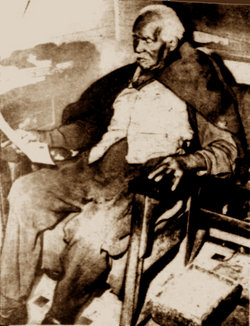Slave to Civil War Soldier and first African American to Vote in New Jersey. He was a Private in Company H., 33rd Ohio Infantry. Simon Douglas who served on both sides in the Civil War, was born on a South Carolina plantation. A houseboy who acquired skill at horseshoe making, Douglas went off in 1862 to the battlefront as a body servant to several family sons. Once his master's sons had died or had gotten killed or their unit captured (mid-1864), Simon chose to win his freedom as a bummer (forager), moving northward with the Blue-clads.
In all his senior life, Simon did not play up either his southern or northern duties in the war.
In 1866, Simon age 23, arrived in Fairview, New Jersey, where for seventy years he worked as a blacksmith.
In his January 8, 1987, letter from Fairview, Dominick T. Majetta, aged 67, volunteered:
I remember Mr. Douglas well. On warm days he took sun in his yard. He was nearly blind; his hair, snow white. My father, who died 15 years ago at 93, told me Douglas shod horses for him. In the mid-1940's Louis Battaglia, Mayor of Fairview 1950-64, tried to get a Civil War pension for Douglas, but to no avail. The federal government said his name was not entered on U.S. Army muster rolls. Everyone in town knew of the effort. As far as I know, he couldn't read or write. He said he shod horses for the cavalry, another reason he was allowed to accompany federal troops. He never claimed enlistment. Earlier, he dug trenches and tended horses for the South but wasn't a Confederate, as far as actual soldiering.
In his February 10, 1987, letter from Fairview, Michael Orrechio, 82-plus-years old, parliamentarian, consultant, teacher, lecturer, conveyed these thoughts:
Since Fairview is only 8/10 this of a square mile--535 acres, I never lived more than a quarter mile from the Douglas residence. As a five-year-old, I first knew Mr. Douglas in 1909. He was about 5' 10" physically and morally strong. His house was a faded yellow, two stories at 154 Broad Avenue.
His blacksmith shop fronted on Broad Avenue. My father, Anthony, for years had brought his horses for shoeing. During the early 1900's the prize for four shoes--ice cleats and hoof pads (where indicated-- it was about $2. Douglas claimed to be the first Negro to cast a vote in this part of the world. Until 1900 the yearly taxes on his property were $15. From then on they rose rather sharply. By 1937 Simon owed $2,382 to Fairview. The humanitarian concept of municipal tax relief for the elderly, currently in vogue, is relatively, recent practice....
This family maintained their pride and dignity in the face of crushing financial adversity--lack of employment, sickness, progressive loss of Simon's sight, low income. My immediate concern, at the time, was to stay the eviction of the Douglas's from their old homestead and to stand by them in their hour of need. Everyone who participated in the SIMON DOUGLAS FUND demonstrated assurance that there were people in Fairview who cared about their plight. With sensitivity we set up the fund. The Bergen Evening Record committed itself to the project that fall of 1949 and we raised the needed funds. We are a little richer because the Douglas's lived among us.
Mary Douglas gave her father the best of home care. The eldest of Civil War personalities, Simon lapsed into a coma his final two days.
Simon Douglas was a personality whose mettle was in the forge of human life, who beauty only improved under the hammering of daily living. For him no pensions, no parades, no monument, no flag. In lowliness he came and went and dwelt among us. Given that through the whole armor of his lowliness there shone the choice alloy of a spiritual loftiness, we can only conclude:
"Dis chille got wings."
Source: Black Confederates

